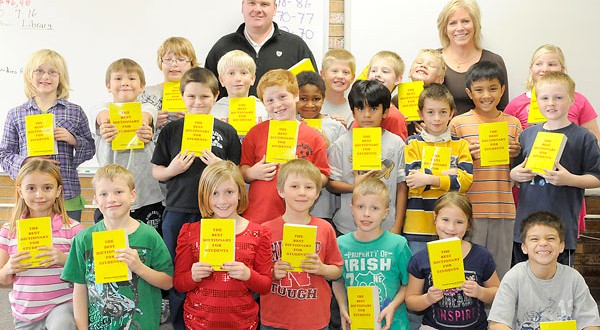Perkins County third graders receive new dictionaries from local Rotarians
Several Grant Rotarians gathered for a special occasion last week—presentation of dictionaries to the third graders at Perkins County Elementary.
“The Best Dictionary for Students” with a subtitle, “Knowledge is Power” got the children very excited over having thousands of words at their fingertips, looking up words and taking the event very seriously.
The local Rotary club has taken part in the dictionary project for several years.
Brand new dictionaries were presented to the students with the goal of the program to assist them in becoming good writers, active readers, creative thinkers and resourceful learners. They can use the dictionaries at school and at home for years to come.
Because educators view third grade as the dividing line between learning to read and reading to learn, it’s a perfect time to encourage students to improve their communication skills and make the most of their education.
Third grade teachers at Perkins County Elementary in Grant are Cindy Regier and Pennie Reese.
History of the Project
The idea for the Dictionary Project began in 1992 when Annie Plummer of Savannah, Ga. gave 50 dictionaries to children who attended a school close to her home.
Each year she continued to give this gift, raising money to help give more and more books so that in her lifetime she raised enough money to buy 17,000 dictionaries for children in Savannah.
Early on, her project attracted the attention of Bonnie Beeferman of Hilton Head, S.C., who began a project of raising money by selling crafts to buy dictionaries for the schoolchildren of Hilton Head and the surrounding communities.
By 1995, Beeferman was getting so many requests from local teachers to be included in the project that she wrote a letter to the editor of the Charleston Post and Courier explaining the project and asking for someone to help meet requests from the Charleston area.
Mary French, who was already an active school volunteer even though her two children were still of preschool age, read the letter and decided this was a project for her.
Starting with a few schools in Charleston and Summerville, she realized quickly that providing dictionaries to all the students in Charleston was going to require serious fundraising. She and her husband formed a 501(c)(3) nonprofit association in 1995, along with a board of directors. He served as president, she became the director of the association, and the Dictionary Project was born.
Since its implementation in 1995, over 14 million children have received dictionaries because thousands of people saw the same need in communities all over the United States.
The original goal set by the board was to provide dictionaries to all third grade students in South Carolina every year. This goal was achieved in 1999.
After The Wall Street Journal published a story about the project in March 2002, the Dictionary Project took on a national purpose and expanded its mission to include students in the 50 United States.
The program is typically implemented in the third grade each year, since this is the age at which dictionary skills are usually taught.
The program has been adopted and refined by individuals, businesses, and civic organizations all over the country such as Rotary Clubs, Kiwanis Clubs, Elks Lodges, Lions Clubs, etc.






